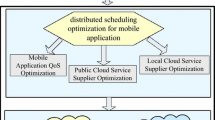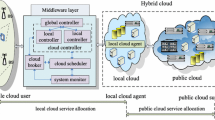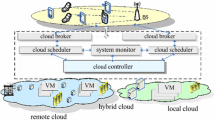Abstract
The paper proposes QoS based service allocation optimization in hybrid mobile cloud. The optimization formulation of the hybrid mobile cloud utility adopts a network utility maximization framework. The proposed hybrid cloud service allocation framework leads to a decomposition of the overall hybrid mobile cloud system problem into a separate problem for mobile user and one for the hybrid cloud provider. The mathematic solution of proposed model is concerned with the variables of local and public cloud. When the equilibrium prices of public cloud services and local cloud services are obtained, the system performance can be optimized. The QoS based two-layer service allocation optimization problem leads to two sub-algorithms. Interactions between the two sub-problems are through optimal variables for capacities of local or public cloud resources and service need. When the convergence points of the two sub-problems of public and local cloud service allocation are obtained, the optimal solution for hybrid mobile cloud utility is acquired. The system design issues of QoS based two-layer service allocation model are also given. The experiments study how data size, request arrival rate, number of cloud nodes have the effect on proposed algorithm and other compared algorithms.















Similar content being viewed by others
Explore related subjects
Discover the latest articles and news from researchers in related subjects, suggested using machine learning.References
Abolfazli, S., Gani, A., Chen, M.: Hmcc: a hybrid mobile cloud computing framework exploiting heterogeneous resources. In: 2015 3rd IEEE International Conference on Mobile Cloud Computing, Services, and Engineering (MobileCloud), pp. 157–162. IEEE (2015)
Akbar, A., Lewis, P.R.: Towards the optimization of power and bandwidth consumption in mobile-cloud hybrid applications. In: 2017 Second International Conference on Fog and Mobile Edge Computing (FMEC), pp. 213–218. IEEE (2017)
Aldwyan, Y., Sinnott, R.O.,: Recovery-oriented resource management in hybrid cloud environments. In: CLOSER 2017—Proceedings of the 7th International Conference on Cloud Computing and Services Science, pp. 225–237 (2017)
Balagoni, Y., Rao, R.R.: A cost-effective SLA-aware scheduling for hybrid cloud environment. In: 2016 IEEE International Conference on Computational Intelligence and Computing Research (ICCIC), pp. 1–7. IEEE (2016)
Barbarossa, S., Sardellitti, S., Di Lorenzo, P.: Joint allocation of computation and communication resources in multiuser mobile cloud computing. In: 2013 IEEE 14th Workshop on Signal Processing Advances in Wireless Communications (SPAWC), pp. 26–30. IEEE (2013)
Cai, Y., Yu, F.R., Bu, S.: Dynamic operations of cloud radio access networks (C-RAN) for mobile cloud computing systems. IEEE Trans. Veh. Technol. 65(3), 1536–1548 (2016)
Champati, J.P., Liang, B.: One-restart algorithm for scheduling and offloading in a hybrid cloud. In: 2015 IEEE 23rd International Symposium on Quality of Service (IWQoS), pp. 31–40. IEEE (2015)
Chen, L., Duan, Y., Qiu, M., Xiong, J.: Adaptive resource allocation optimization in heterogeneous mobile cloud systems. In: IEEE International Conference on Cyber Security and Cloud Computing (CSCloud), pp. 19–24 (2015)
Chen, M.H., Dong, M., Liang, B.: Joint offloading decision and resource allocation for mobile cloud with computing access point. In: 2016 IEEE International Conference on Acoustics, Speech and Signal Processing (ICASSP), pp. 3516–3520. IEEE (2016)
Chopra, N., Singh, S.: Deadline and cost based workflow scheduling in hybrid cloud. In: 2013 International Conference on Advances in Computing, Communications and Informatics (ICACCI), pp. 840–846. IEEE (2013)
Chunlin, L., Layuan, L.: Exploiting composition of mobile devices for maximizing user QoS under energy constraints in mobile grid. Inf. Sci. 279(20), 654–670 (2014)
Chunlin, L., LaYuan, L.: An efficient market strategy based optimal scheduling in hybrid cloud environments. Wirel. Pers. Commun. 83(1), 581–602 (2015a)
Chunlin, L., Layuan, L.: cost and energy aware service provisioning for mobile client in cloud computing environment. J. Supercomput. 71(4), 1196–1223 (2015b)
Colombo-Mendoza, L.O., Alor-Hernández, G., Rodríguez-gonzález, A., et al.: MobiCloUP!: a PaaS for cloud services-based mobile applications. Autom. Softw. Eng. 21(3), 391–437 (2014)
Gai, K., Qiu, M., Zhao, H., et al.: Dynamic energy-aware cloudlet-based mobile cloud computing model for green computing. J. Netw. Comput. Appl. 59, 46–54 (2016)
Genez, T.A.L., Bittencourt, L., Fonseca, N., et al.: Estimation of the available bandwidth in inter-cloud links for task scheduling in hybrid clouds. IEEE Trans. Cloud Comput. (2015)
Ghasemi-Falavarjani, S., Nematbakhsh, M., Ghahfarokhi, B.S.: Context-aware multi-objective resource allocation in mobile cloud. Comput. Electr. Eng. 44, 218–240 (2015)
Jha, R.S., Gupta, P.: Power & load aware resource allocation policy for hybrid cloud. Procedia Comput. Sci. 78, 350–357 (2016)
Karamoozian, A., Hafid, A., Boushaba, M., et al.: QoS-aware resource allocation for mobile media services in cloud environment. In: 2016 13th IEEE Annual Conference on Consumer Communications & Networking Conference (CCNC), pp. 732–737. IEEE (2016)
Kelly, F.P., Maulloo, A., Tan, D.: Rate control for communication networks: shadow prices, proportional fairness and stability. J. Oper. Res. Soc. 49(3), 237–252 (1998)
Khaledi, M., Kasera, S.K.: Profitable task allocation in mobile cloud computing. arXiv preprint arXiv:1608.08521 (2016)
Kuchuk, G., Nechausov, S., Kharchenko, V.: Two-stage optimization of resource allocation for hybrid cloud data store. In: 2015 International Conference on Information and Digital Technologies (IDT), pp. 266–271. IEEE (2015)
Kuhn, H.W., Tucker, A.W.: Nonlinear programming. In: Proceedings of 2nd Berkeley Symposium, pp. 481–492. University of California Press, Berkeley (1951)
Kwak, J., Kim, Y., Lee, J., et al.: DREAM: dynamic resource and task allocation for energy minimization in mobile cloud systems. IEEE J. Sel. Areas Commun. 33(12), 2510–2523 (2015)
KwonEmail, Y.-W., Tilevich, E.: Cloud refactoring: automated transitioning to cloud-based services. Autom. Softw. Eng. 21(3), 345–372 (2014)
Lee, S., Seo, K.K.: A hybrid multi-criteria decision-making model for a cloud service selection problem using BSC, fuzzy Delphi method and fuzzy AHP. Wirel. Pers. Commun. 86(1), 57–75 (2016)
Liu, F., Luo, B., Niu, Y.: Cost-effective service provisioning for hybrid cloud applications. Mobile Netw. Appl. 22(2), 153–160 (2017)
Luh, P.B., Hoitomt, D.J.: Scheduling of manufacturing systems using the Lagrangian relaxation technique. IEEE Trans. Autom. Control 38(7), 1066–1079F (1993)
Moon, S., Kim, J., Kim, T., et al.: Reverse auction-based resource allocation policy for service broker in hybrid cloud environment. Cloud Comput. 2015, 76 (2015)
Nabi, S.A., Gurram, D., Ali, M.A.: Mobile hybrid cloud computing for educational institutions: Mobihybrid educloud. In: 2015 International Conference on Innovations in Information, Embedded and Communication Systems (ICIIECS), pp. 1–6. IEEE (2015)
Park, J.S., Yu, H.C., Lee, E.Y.: Resource allocation techniques based on availability and movement reliability for mobile cloud computing. In: International Conference on Distributed Computing and Internet Technology, pp. 263–264. Springer, Berlin (2012)
Raei, H., Yazdani, N.: Analytical performance models for resource allocation schemes of cloudlet in mobile cloud computing. J. Supercomput. 73(3), 1274–1305 (2017)
Rezaeian, A., Abrishami, H., Abrishami, S., et al.: a budget constrained scheduling algorithm for hybrid cloud computing systems under data privacy. In: 2016 IEEE International Conference on Cloud Engineering (IC2E), pp. 230–231. IEEE (2016)
Sharif, S., Taheri, J., Zomaya, A.Y., et al.: Online multiple workflow scheduling under privacy and deadline in hybrid cloud environment. In: 2014 IEEE 6th International Conference on Cloud Computing Technology and Science (CloudCom), pp. 455–462. IEEE (2014)
Shi, T., Yang, M., Li, X., Lei, Q., Jiang, Y.: An energy-efficient scheduling scheme for time-constrained tasks in local mobile clouds. Pervasive Mobile Comput. 27, 90–105 (2016)
Sun, Y., White, J., Li, B., Walker, M., Turner, H.: Automated QoS-oriented cloud resource optimization using containers. Autom. Softw. Eng. 24(1), 101–137 (2017)
Wang, X., Gui, Q., Liu, B., et al.: Enabling smart personalized healthcare: a hybrid mobile-cloud approach for ECG telemonitoring. IEEE J. Biomed. Health Inform. 18(3), 739–745 (2014)
Wang, K., Yang. K., Wang, X., et al.: Cost-effective resource allocation in C-RAN with mobile cloud. In: 2016 IEEE International Conference on Communications (ICC), pp. 1-6. IEEE (2016)
Wohlin, C., Runeson, P., Höst, M., Ohlsson, M.C., Regnell, B., Wesslén, A.: Experimentation in Software Engineering. Springer, Berlin (2012)
Yangui, S., Ravindran, P., Bibani, O., et al.: A platform as-a-service for hybrid cloud/fog environments. In: 2016 IEEE International Symposium on Local and Metropolitan Area Networks (LANMAN), pp. 1–7. IEEE (2016)
Zarei, M.H., Shirsavar, M.A., Yazdani, N.: A QoS-aware task allocation model for mobile cloud computing. In: 2016 Second International Conference on Web Research (ICWR), pp. 43–47. IEEE (2016)
Acknowledgements
The authors thank the editors and the anonymous reviewers for their helpful comments and suggestions. The work was supported by the National Natural Science Foundation (NSF) under Grants (Nos. 61472294, 61672397, 61771354), the Open Research Fund of Beijing Key Laboratory of Big Data Technology for Food Safety, Beijing Technology and Business University (Grant No. BKBD-2017KF01). Any opinions, findings, and conclusions are those of the authors and do not necessarily reflect the views of the above agencies.
Author information
Authors and Affiliations
Corresponding author
Appendix
Appendix
1.1 Proofs for Theorem 1
The formulation of mobile user optimization is rewritten as follows:
The Lagrangian expression of \( MaxU_{mu} (\mathop u\nolimits_{ij}^{mu} ) \) can be written as follows.
where \( \varepsilon ,\eta \) are the multipliers of Lagrangian expression. By using Karush–Kuhn–Tucker Theorem, the optimal mobile user’s payment is gotten, if \( {\raise0.7ex\hbox{${L_{mu} (\mathop u\nolimits_{ij}^{mu} )}$} \!\mathord{\left/ {\vphantom {{L_{mu} (\mathop u\nolimits_{ij}^{mu} )} {\partial \mathop u\nolimits_{ij}^{mu} }}}\right.\kern-0pt} \!\lower0.7ex\hbox{${\partial \mathop u\nolimits_{ij}^{mu} }$}} = 0 \) for \( \varepsilon ,\eta > 0 \).
Let \( {\raise0.7ex\hbox{${L_{mu} (\mathop u\nolimits_{ij}^{mu} )}$} \!\mathord{\left/ {\vphantom {{L_{mu} (\mathop u\nolimits_{ij}^{mu} )} {\partial \mathop u\nolimits_{ij}^{mu} }}}\right.\kern-0pt} \!\lower0.7ex\hbox{${\partial \mathop u\nolimits_{ij}^{mu} }$}} = 0 \)
According to the constraint equation in mobile user optimization, let \( \varsigma = 1 + \varepsilon + \eta \tau \)
We replace \( \varsigma \) to obtain \( \mathop {\mathop u\nolimits_{ij}^{mu} }\nolimits^{ * } \), which is optimal payment given by the mobile user.
1.2 Proofs for Theorem 2
The Lagrangian expression of \( MaxU_{pc} \) is \( L_{pc} (s_{jl}^{pc} ,\mathop s\nolimits_{jk}^{b} ) \).
In above equation, \( \lambda ,\beta \) are the Lagrangian constants.
Let \( L_{pc} (s_{jl}^{pc} ,\mathop s\nolimits_{jk}^{b} )/s_{jl}^{pc} = 0 \)
According to the constraint equation \( C_{l}^{pc} \ge \sum\limits_{j} {s_{jl}^{pc} } \), \( \lambda \) is written as follows:
We replace \( \lambda \) to obtain \( s_{jl}^{pc*} \)
\( s_{jl}^{pc*} \) is the public cloud service allocated to local cloud agent for maximizing the revenue.
The bandwidth allocation can be solved by the similar approach. \( \mathop s\nolimits_{jk}^{b*} \) is optimal bandwidth allocated to local cloud agent.
1.3 Proofs for Theorem 3
The utility of local cloud agent is rewritten as follows.
The Lagrangian function for local cloud agent can be formulated as follows.
where \( \vartheta \) is the Lagrangian constant.
Let \( \partial L_{lc} (v_{jl}^{lc} ,v_{jk}^{b} )/\partial v_{jl}^{lc} = 0 \)
\( v_{jl}^{lc*} \) can be obtained
\( v_{jl}^{lc*} \) is the optimal payment of the local cloud agent given to public cloud supplier.
By using the same approach, \( v_{jk}^{b*} \) is local cloud agent’s payment for bandwidth provider.
Rights and permissions
About this article
Cite this article
Li, C., Zhang, J., Chen, Y. et al. Efficient QoS aware two-layer service allocation in hybrid mobile cloud. Autom Softw Eng 25, 569–593 (2018). https://doi.org/10.1007/s10515-018-0233-x
Received:
Accepted:
Published:
Issue Date:
DOI: https://doi.org/10.1007/s10515-018-0233-x




